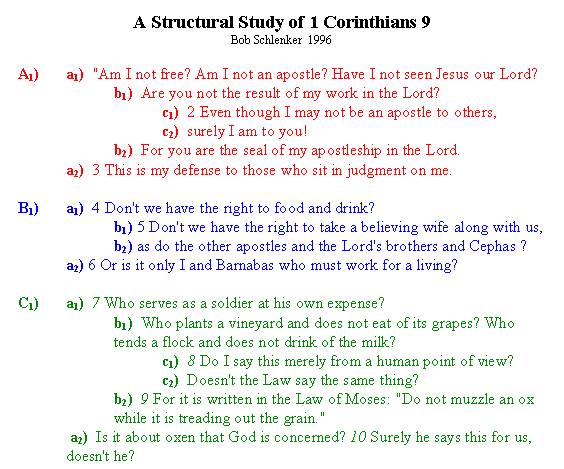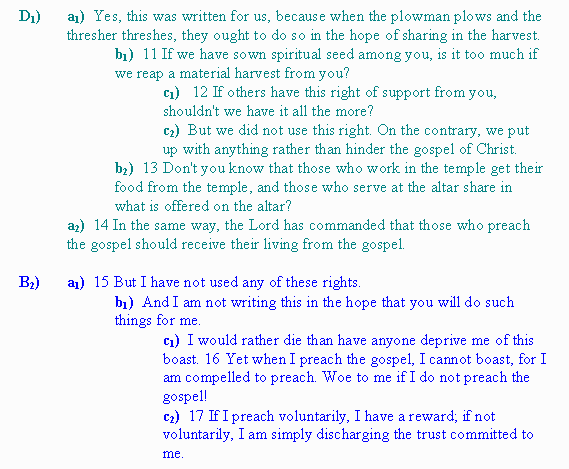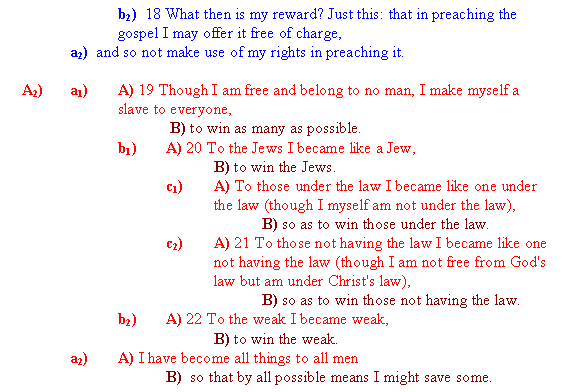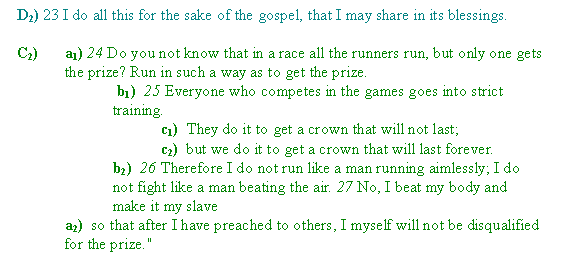|
|
|

But just as you excel in everything--in faith, in speech, in knowledge, in complete earnestness and in your love for us --see that you also excel in this grace of giving. 8 I am not commanding you, but I want to test the sincerity of your love by comparing it with the earnestness of others. 9 For you know the grace of our Lord Jesus Christ, that though he was rich, yet for your sakes he became poor, so that you through his poverty might become rich. 10 And here is my advice about what is best for you in this matter: Last year you were the first not only to give but also to have the desire to do so. 11 Now finish the work, so that your eager willingness to do it may be matched by your completion of it, according to your means. 12 For if the willingness is there, the gift is acceptable according to what one has, not according to what he does not have. 13 Our desire is not that others might be relieved while you are hard pressed, but that there might be equality. 14 At the present time your plenty will supply what they need, so that in turn their plenty will supply what you need. Then there will be equality, 15 as it is written: "He who gathered much did not have too much, and he who gathered little did not have too little." 2 Corinthians 8:7-15Here's the general principle about giving, receiving and proportional return.
Give, and it will be given to you. A good measure, pressed down, shaken together and running over, will be poured into your lap. For with the measure you use, it will be measured to you. Luke 6:38And, here's an example of what money is good for.
Jesus told his disciples: "There was a rich man whose manager was accused of wasting his possessions. 2 So he called him in and asked him, 'What is this I hear about you? Give an account of your management, because you cannot be manager any longer.' 3 "The manager said to himself, 'What shall I do now? My master is taking away my job. I'm not strong enough to dig, and I'm ashamed to beg-- 4 I know what I'll do so that, when I lose my job here, people will welcome me into their houses.' 5 "So he called in each one of his master's debtors. He asked the first, 'How much do you owe my master?' 6 "'Eight hundred gallons of olive oil,' he replied. "The manager told him, 'Take your bill, sit down quickly, and make it four hundred.' 7 "Then he asked the second, 'And how much do you owe?' "'A thousand bushels of wheat,' he replied. "He told him, 'Take your bill and make it eight hundred.' 8 "The master commended the dishonest manager because he had acted shrewdly. For the people of this world are more shrewd in dealing with their own kind than are the people of the light. 9 I tell you, use worldly wealth to gain friends for yourselves, so that when it is gone, you will be welcomed into eternal dwellings. 10 "Whoever can be trusted with very little can also be trusted with much, and whoever is dishonest with very little will also be dishonest with much. 11 So if you have not been trustworthy in handling worldly wealth, who will trust you with true riches? 12 And if you have not been trustworthy with someone else's property, who will give you property of your own? 13 "No servant can serve two masters. Either he will hate the one and love the other, or he will be devoted to the one and despise the other. You cannot serve both God and Money." 14 The Pharisees, who loved money, heard all this and were sneering at Jesus. 15 He said to them, "You are the ones who justify yourselves in the eyes of men, but God knows your hearts. What is highly valued among men is detestable in God's sight. Luke 16:1-15Serve God instead of Money, using worldly wealth to gain friends for yourselves.
Give to everyone who asks you, and if anyone takes what belongs to you, do not demand it back.Luke 6:30Can you imagine a community where people obeyed those commands? It would be like Acts 2:42-47.
They devoted themselves to the apostles' teaching and to the fellowship, to the breaking of bread and to prayer. 43 Everyone was filled with awe, and many wonders and miraculous signs were done by the apostles. 44 All the believers were together and had everything in common. 45 Selling their possessions and goods, they gave to anyone as he had need. 46 Every day they continued to meet together in the temple courts. They broke bread in their homes and ate together with glad and sincere hearts, 47 praising God and enjoying the favor of all the people. And the Lord added to their number daily those who were being saved.




 This is the first such pattern I've encountered. In keeping with
way the other patterns have been named I guess this would best be called
a kind of an inversion. 1Each half has its two sections reappear in an inverted order. Now, each
section is further organized into a pattern called introversion. Each is
in three levels except for two, B1), which is in two, and D2)
which is singular. Within sections D1) and A2), subdivisions
occur. Within A2), their order remains consistent throughout, but
within, D1), there is an inversion evidenced which, because the
overall pattern is inversion, draws our attention most particularly to
it, and even more specifically, to its pivotal segments c).
This is the first such pattern I've encountered. In keeping with
way the other patterns have been named I guess this would best be called
a kind of an inversion. 1Each half has its two sections reappear in an inverted order. Now, each
section is further organized into a pattern called introversion. Each is
in three levels except for two, B1), which is in two, and D2)
which is singular. Within sections D1) and A2), subdivisions
occur. Within A2), their order remains consistent throughout, but
within, D1), there is an inversion evidenced which, because the
overall pattern is inversion, draws our attention most particularly to
it, and even more specifically, to its pivotal segments c).
"But God chose the foolish things of the world to shame the wise; God chose the weak things of the world to shame the strong. 28 He chose the lowly things of this world and the despised things--and the things that are not--to nullify the things that are, 29 so that no one may boast before him. 30 It is because of him that you are in Christ Jesus, who has become for us wisdom from God--that is, our righteousness, holiness and redemption. 31 Therefore, as it is written: 'Let him who boasts boast in the Lord.'"Did you notice the close relation between shame and boasting? Both of these concepts appear in the same verse in II Corinthians 11:21. Shame is intended to humble the one boasting before God in his own abilities and attributes. All boasting should be solely based upon God's benefits and done for His glory.
And I will keep on doing what I am doing in order to cut the ground from under those who want an opportunity to be considered equal with us in the things they boast about. II Corinthians 11:12
But he said to me, "My grace is sufficient for you, for my power is made perfect in weakness." Therefore I will boast all the more gladly about my weaknesses, so that Christ's power may rest on me.II Corinthians 12:9In all of this ninth chapter of I Corinthians we've got under the microscope, this section B2) is the only one in which boasting appears. Although shame is not mentioned directly, having an understanding of the reason for boasting helps us see that Paul is using this section in his argument to shame his accusers so that they will have the ground cut from under them; so that they will be brought or restored to humility before God.
Therefore, my dear brothers, stand firm. Let nothing move you. Always give yourselves fully to the work of the Lord, because you know that your labor in the Lord is not in vain.Based upon my structural analysis of the entire chapter of I Corinthians 15, I conclude that this is the focal verse of the whole chapter!
c1) 12 If others have this right of support from you, shouldn't we have it all the more?This is the essence of Paul's message in I Corinthians 9. Let me complete what I believe to be the essence of the message by repeating what is perhaps equally emphatic by reason of its unique structural character. 4
c2) But we did not use this right. On the contrary, we put up with anything rather than hinder the gospel of Christ.
D2) 23 I do all this for the sake of the gospel, that I may share in its blessings.The primary themes of the passage are pretty much found in these most emphatic verses 12 and 23! (As a noteworthy and magnificent structural complexity, I will share with you the fact that the theme of c1) matches that of section B1) and that of c2) matches that of section B2). Interesting? )
"Was it a sin for me to lower myself in order to elevate you by preaching the gospel of God to you free of charge? 8 I robbed other churches by receiving support from them so as to serve you. 9 And when I was with you and needed something, I was not a burden to anyone, for the brothers who came from Macedonia supplied what I needed. I have kept myself from being a burden to you in any way, and will continue to do so. 10 As surely as the truth of Christ is in me, nobody in the regions of Achaia will stop this boasting of mine. 11 Why? Because I do not love you? God knows I do! 12 And I will keep on doing what I am doing in order to cut the ground from under those who want an opportunity to be considered equal with us in the things they boast about. 13 For such men are false apostles, deceitful workmen, masquerading as apostles of Christ. 14 And no wonder, for Satan himself masquerades as an angel of light. 15 It is not surprising, then, if his servants masquerade as servants of righteousness. Their end will be what their actions deserve."A few verses later, in II Corinthians 12:13-16, we read:
"How were you inferior to the other churches, except that I was never a burden to you? Forgive me this wrong! 14 Now I am ready to visit you for the third time, and I will not be a burden to you, because what I want is not your possessions but you. After all, children should not have to save up for their parents, but parents for their children. 15 So I will very gladly spend for you everything I have and expend myself as well. If I love you more, will you love me less? 16 Be that as it may, I have not been a burden to you. Yet, crafty fellow that I am, I caught you by trickery!"So, I Corinthians 9 is where we find the most extensive teaching about the support relationship between the one preaching the gospel and those to whom the ministry extends, but not the only teaching. Much more can be learned about the more inclusive and general subject of giving and receiving from the other epistles, particularly II Corinthians, but there is no other passage beside 1 Co. 9 in which we learn so extensively the details of support due those who minister. There are a few other passages which briefly deal with the subject which I would like to include in this study.
"The elders who direct the affairs of the church well are worthy of double honor, especially those whose work is preaching and teaching. 18 For the Scripture says, "Do not muzzle the ox while it is treading out the grain," and "The worker deserves his wages" I Timothy 5:17-18I will close with a prayer. Lord, may your love be known who all who hear your voice, who choose to obey you in matters of sacrifice and self discipline. As you are the master to whom we ultimately serve, help us entrust the provisions of our lives into your care. Help us to have courage in the face of apparent lack so that we may not be deceived in our carnal nature. Help us to have humility in the face of apparent plenty so that we may also not be deceived in that same carnal nature. May we, as Paul your servant did, learn to be content in our present conditions, whatever they may be.